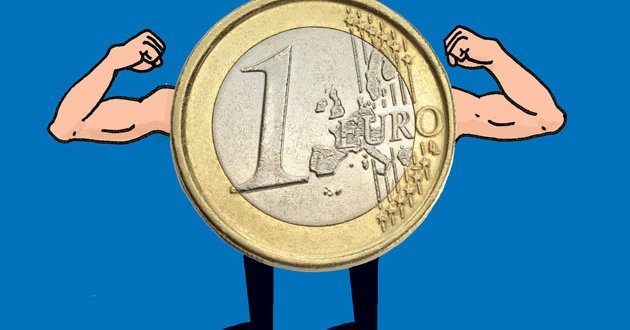Eurosceptic argument: The euro is doomed to fail! Exit asap!
This is not (neccesarily) true!
Eurosceptics usually only tell half of the story: the euro is likely to fail, but only if we don’t manage to build a political union (point 1). They have predicted the downfall of the euro again and again and yet now we see that the euro still stands, that the eurozone has been reformed and is slowly climbing out of the recession. We are surviving this storm and becoming stronger (point 2). This all proves that the euro is not doomed to fail, but the crisis was a solid warning that we need to build a fiscal, economic and political federal union if we want to make sure that the euro is here to stay in the long-run and guides the eurozone into prosperity for all of its citizens
Eurosceptics only tell half of the story: the euro is only likely to fail without political union
The euro is only likely to fail as long as we are unable to build a political union in the eurozone. Saving the euro means building political union in Europe, building a true European political government.
Eurosceptic speakers often refer to economic experts that said that a single currency could not work in Europe. The argument often used goes like this: Europe doesn’t have high labour mobility, wage and price flexibility are to low, risk-sharing mechanisms such as fiscal transfer mechanisms do not really exist in Europe and economic fluctuations in the Member States are not occurring always at the same time. All these elements mean that the eurozone is not an Optimum Currency Area, and the euro is therefore destined to fail.
The fact of the matter is that such eurosceptic speakers conveniently forget to mention the other half of the story told by economic experts such as nobel prize winners Amartya Sen and Joseph Stiglitz. That second half of the story goes like this: the euro may eventually fail… if the eurozone doesn’t manage to evolve into a fiscal and economic union, which are only possible within a political union. Such a political union would enable policies to create an optimum currency area in the eurozone. The promotion of labour mobility, the alleviation of macro-economic and social imbalances, the integration of regulation for wage and price flexibility, solidarity mechanisms to support countries and regions in difficulty and support their structural reforms, European economic policy to further integrate and grow European economy in the vital sectors of infrastructure, energy and the new digital world, etcetera... These instruments require a political union! In the long run we cannot manage the euro with 18 (and eventually more) uncoordinated national economic policies and politics. So what europhobes say is only partly true: the euro is only likely to fail, if they manage to block a political union … and they won’t!
Eurosceptics were wrong: the euro didn’t fail and is actually getting stronger again.
If we would have listened to eurosceptics, there’s no telling where we would have been now. Contrary to what they said, the euro survived, debt-ridden countries are reforming and the Eurozone is leaving the recession. Things are bad, but they are getting better.
Since 2012, newspapers in a several countries contain opinion pieces stating that the time is right for some countries to leave the eurozone, or disaster would strike. These commentators argued that Greece had to get out before things would spiral out of control. That Portugal, Italy and Cyprus were beyond saving. Or according to others they had to “exit the euro” as soon as possible to regain their economic flexibility and sovereignity. However, after reform in the crisis-ridden countries and solidarity of other countries in the past 2 years, we see that the skies are now clearing. The eurozone economy is slowly exiting the recession, the crisis countries are reforming and the pace of austerity is finally set to slow down. Things are still bad, unemployment is still a major plague in many countries and growth remains sluggish, but we are getting better. For any individual country and for the eurozone as a while, leaving the eurozone now would be a terrible idea. Leaving the eurozone would be an extremely complex exercise, for which there is no legal basis: all would have to be negotiated. The country that would exit would see its new national currency immediately devaluate massively, its debt to foreign creditors skyrocket, its costs for energy and other imports increase, and the value of the savings and property of its citizens plummet versus the euro, in essence an expropriation! We are all in a boat together and we have survived the storm, regardless of what the eurosceptics told us. It might still be uncomfortable to be in the same boat with 18 countries and no single skipper, but leaving the eurozone now would be the same as sinking the boat in which we are all sitting together. Better believe in the future and sail stronger together.


Follow the comments: |
|
